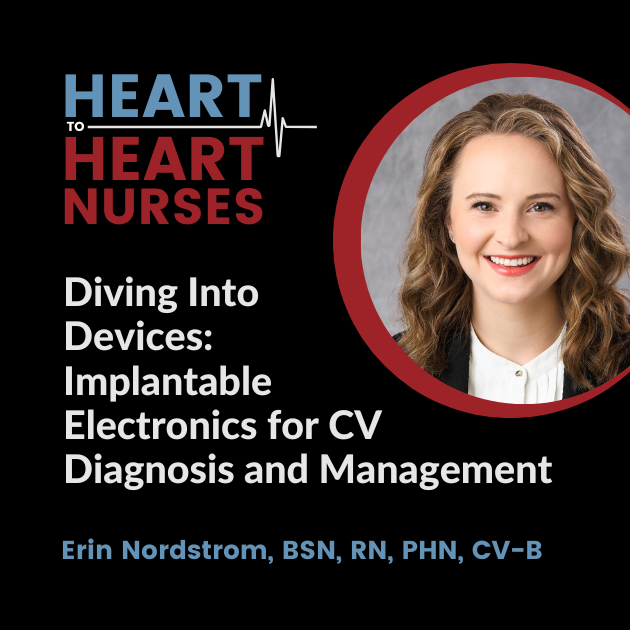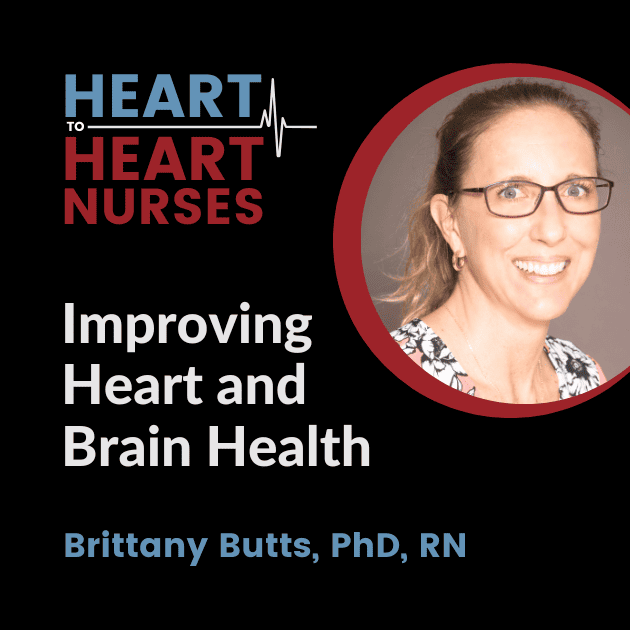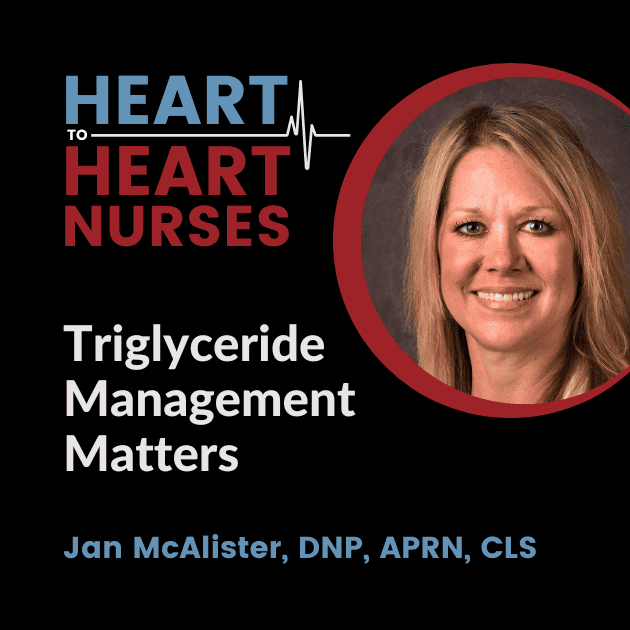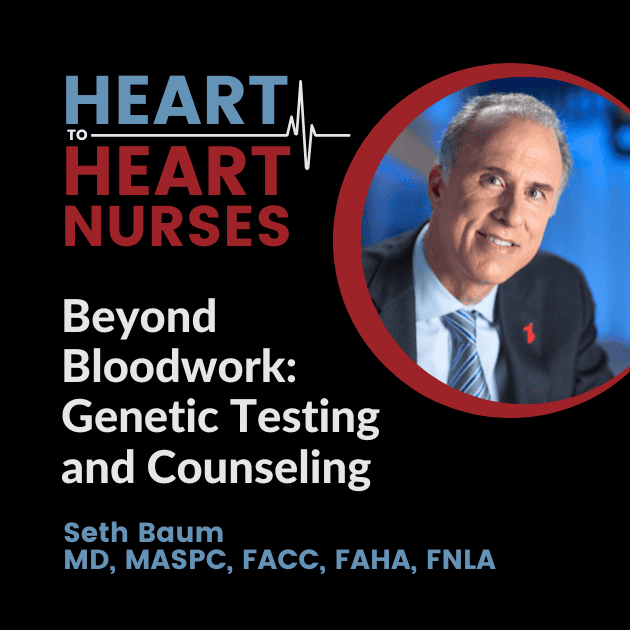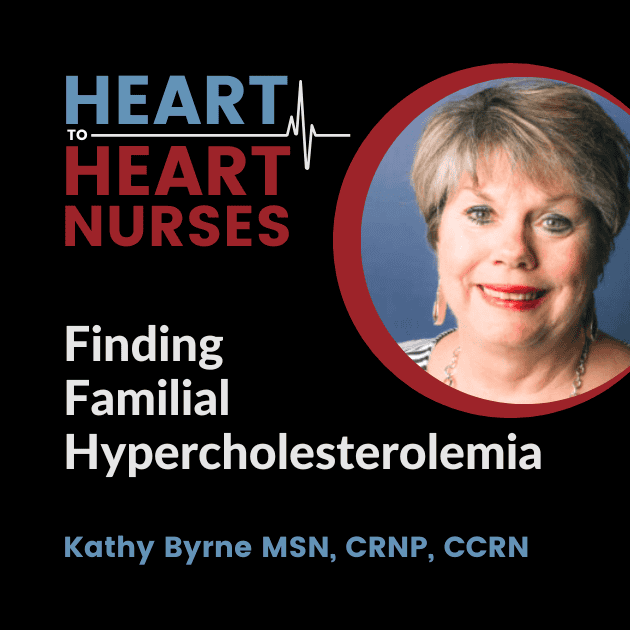Episode Resources
Welcome to Heart to Heart Nurses, brought to you by the Preventive Cardiovascular Nurses Association. PCNA's mission is to promote nurses as leaders in cardiovascular disease prevention and management.
Geralyn Warfield (host): I’d like to welcome our audience today where we're having an exceptional conversation with Karen Laing. Karen, could you introduce yourself briefly to us?
Karen Laing (guest): Sure. So, I have been involved actually with PCNA—I was talking to Terry Thomas last night—I think my introduction to them was back in the mid- to late- 90s, before it was PCNA, when she and Nancy came to visit the cardiopulmonary rehab where I was working.
So, I've worked a long time. I started out in surgical ICU and always thought it would be great to get ahold of those patients before they had surgery—a lot of them were cardiovascular.
And so, I transitioned [00:01:00] into cardiac rehab, but people still had to have that diagnosis in order to get the help that they needed. And so, then I became a health and wellness nurse coach. And so now, I wear a couple of hats, actually. I added a new hat in December. I graduated with my MSN and am now a nurse practitioner as well. So, I'm a health and wellness nurse coach. I work as an RN and also as an NP. So, I’ve got a few different hats going here.
Geralyn Warfield (host): Well, one of the things that really is interesting to me is how your career has changed over time. And the fortunate/unfortunate thing is there's no shortage of patients who need this kind of intervention, this kind of support. Have you seen much change in your patients in the time since you've started until now?
Karen Laing (guest): Yeah. It's interesting you say that, because I always say I'm trying to work my way out of a job, but it's not looking promising. They [patients] keep getting younger and they're more of them. [00:02:00] So, I do think that more people nowadays are more interested in what they can do for themselves than I probably saw when I began this journey.
Geralyn Warfield (host): Well, I'm appreciative of the fact that you have seen a lot of changes in your career. But there are some things that have stayed pretty steady and that is that healthy living, healthy lifestyle. And I'm hoping you can talk a little bit about the six pillars.
Karen Laing (guest): Yes, yes. So, I'm very active in another organization that promotes lifestyle medicine, which is a beautiful fit for PCNA, because as we know, the majority of all those guideline-directed therapies is lifestyle. And so, we have six pillars in lifestyle medicine.
So, the six pillars of lifestyle medicine are:
- Daily stress management
- Quality sleep
- Quality food—very plant predominant
- Regular physical activity
- Strong [00:03:00] social connections, and
- Avoidance of risky substances
So, with those pillars, as you can imagine, you know, the majority of the diseases that we're working with, not just cardiovascular disease, but also cancer, and a lot of the autoimmune things that we see, could benefit significantly if we're able to optimize those. We may not be able to heal people.
I always tell people I'm not anti-medication. I am anti any medication we can do through lifestyle instead.
Geralyn Warfield (host): I also heard you say earlier that your patients are becoming younger and younger. And there are more and more of them. So, are you finding that those patients that you're seeing that weren't part of your traditional patient load when you first started this career, do they have an increased interest in this, or is it all the people that you're seeing have an increased [interest]?
Karen Laing (guest): I would say all, because sometimes the younger people, because of the stage of life that they're in, they're working, they've got [00:04:00] children, you know, they're very busy and they're having a really hard time caring well for themselves.
Geralyn Warfield (host): I think that's probably for most of our listeners, something that they're facing as well. And so, while this is a great fit for PCA members, and lifestyle management, as you said, is really part of the guidelines, do you have any key considerations for clinicians that are, as part of our audience, things that they should do with their patients or suggest to their patients, or even resources that you could point them to help support their efforts?
Karen Laing (guest): Sure. So, the first thing that I'll say is my patients and my clients hold me accountable. Because I can't ask them to do anything that I'm not going to do. And that's one thing that we see in the research is if a clinician actually is doing the things that they're telling the patient to do, they're more likely to actually tell the patient to do it.
A physically active clinician is more [00:05:00] likely to recommend regular physical activity. Somebody who sleep in four hours a night is unlikely to focus on quality sleep with their patients. So, we need to start with us. That's who we can start with.
As far as resources for lifestyle, I highly recommend the website for the American College of Lifestyle Medicine. It's lifestylemedicine.org. There is a plethora of free available resources to the public. As a member, of course, you get access to more, but there are fantastic resources on there.
Geralyn Warfield (host): We are having a very exciting conversation with Karen Laing. We're going to take a break, and we will be right back.
Geralyn Warfield (host): We're back for more discussion about lifestyle—and how that applies to both patients and clinicians—with our guest, Karen Laing.
Karen, you were talking about a list of things about sleep, and reducing stress, and things that sound really great in theory, if you will. And they're also great in practice. But it's kind of hard to make all those changes all at once. So how does that look [00:06:00] for individuals so they don't feel overwhelmed?
Karen Laing (guest): That's a great question. I find a lot of times people are paralyzed because we have access to so much information. It's really difficult for them. They don't know what to trust, they don't know what to do. And so, they just don't do anything.
And one of the things that I use all the time is ‘just one thing.’ At the end of a coaching session, when I'm working with a client, I assign homework, or they assign themselves homework, and they want to do 10 things. And I'm like, “No, you're going to fail this week if you do that.”
If we can encourage patients, clients to choose just one thing. Choose that thing. Do it well. Next week we'll talk about the next thing. Just taking those little steps forward. We know what we need to be doing. That's not the issue. We're feeling overwhelmed. “I can't do it all right, so I'm just not going to do it at all.”
And encouraging them. [00:07:00] I would be so much kinder than you than I am to myself in most cases. So, we need to encourage them, and help them to move forward, and support them in their success. Because they may only see the nine things they didn't do, not the one thing they did well.
Geralyn Warfield (host): And sometimes as human beings, I think we are, as you said, we are not very kind to ourselves. And this change in behavior has a lot of research behind it, but it's, I think sometimes the getting started, that's the issue. It's the sticking with it, that's the issue. Because of the slips and slides that happen.
Do you have any recommendations for clinicians that are working with patients in terms of supporting patients during those complex times, even if it's just one thing that they're trying, but they're then not successful with that just one thing.
Karen Laing (guest): Sure. So, one thing that just came to mind, was one thing we found that works really well is shared medical appointments. Where you may [00:08:00] see 10 patients and you can actually bill for this. And you may have one specific topic that you're covering in that shared medical appointment, rather than having to say the same thing to all 10 patients throughout the day.
And we know, many of us in PCNA come from a cardiac rehab background, we know the power of a group. And having those connections is really powerful and helpful.
They sometimes will connect outside of those presentations, those groups. I was just talking with a colleague the other day who said she does it once a month. And, you know, it's a scheduled thing, but it's not necessarily the same patients every time. And she was getting ready to start and one of the ladies said, “Oh wait, we can't start because Jim's not here.” You know, so it's not just about what they can get from us. That adds another layer.
Geralyn Warfield (host): I think there's also another potential layer for that group setting where they're actually [00:09:00] in the community and having those interactions outside of that, and that could be keeping themselves and each other accountable. You know, maybe they meet for a coffee, or they meet for a meal and hopefully can support each other in maybe making healthier choices in that regard.
Or, “Let's go for a walk.” Sometimes for some of our patients, safety is a real big issue. And it's easy for us to say, “Go for a walk.” But when you can't do that safely, at least not as an individual, but maybe safety in numbers is the way to go then. Meeting at a place and going for a walk together kind of minimizes that risk. And I think it makes it more appealing for those of us that want to meet other people and talk about things.
And, I've had great friendships myself as I've joined a health club and, you know, those have continued far beyond me moving away from that area. And so, I think that connection, that social connection is often captured in that way, don't you think?
Karen Laing (guest): Absolutely. Yeah. An accountability buddy is huge. [ 00:10:00]
If you're quitting smoking, find someone else who wants to quit smoking. You mentioned going to the gym. On those days, you don't want to go to the gym, your friend’s there waiting for you. You're going to go on the days when he or she doesn't want to go, you're going to be waiting for them. It can really increase your chances of success.
Geralyn Warfield (host): Well, speaking of increasing chances of success, there's another component to that and that is improving satisfaction. Could you talk a little bit more about that?
Karen Laing (guest): Sure. So, sometimes, you know, patients get very discouraged. We see patients that have a list of 20 medications and they're expecting they're going to come in and you're going to add 21.
That can be very discouraging, you know. “What am I looking at ahead?” So, by giving them that power of the lifestyle changes.
“OK, this really can make a difference. You can just, you know, start out with 10 minutes a day of physical activity. It can make a difference. We're going to gradually work your way up. It can make a difference. Just aim for an initial [00:11:00] 5% weight loss. It can make a difference. We can see improvements in your blood pressure. We can see improvements in your blood sugar.”
Helping them believe that that's possible. Stating it as an actual therapy that they can do. That way they get some power, and they don't just feel like a victim. So, it improves patient satisfaction.
We also find that clinicians that increase the amount of lifestyle intervention in their practice are also having a higher level of satisfaction. Because they didn't really get into medicine and/or nursing in order to just see a patient for 10 or 15 minutes and write a prescription. They wanted to take care of people and improve their quality of life. This gives them the tools to do that.
And somewhere, especially as nurses, we have been, you know, Florence Nightingale taught us that lifestyle was [00:12:00] all about it, right? You know, we needed to provide them with good food, and clean water, and a clean place to sleep, and all those kinds of things.
We're getting back to that. And so, it improves our level of satisfaction and clinicians that were ready to leave the profession are finding that this is really a way for them to stay engaged and to be able to make a difference for their patients.
Geralyn Warfield (host): Thank you so very much for helping to encourage us to encourage our patients. Is there any one takeaway from today's talk with us that you would like to share? That you want to reiterate that you think is the most important thing?
Karen Laing (guest): Just start with one thing. It's true in practice as well as for our patients.
So, I know everybody's so super busy and it's hard to think about, “Oh, now she wants me to do one more thing.” I've got to really, you know, it doesn't have to be a really long time. We've also got a lot of data to show that [00:13:00] those brief interventions can be super powerful.
Geralyn Warfield (host): Well, our conversation, we hope, has been very powerful for our audience as well.
Karen Laing, thank you so much for taking time to speak with us today. Your enthusiasm for lifestyle, lifestyle medicine, is really heartening for me, and for our audience.
This is Geralyn Warfield, your host, and we will see you next time.
Thank you for listening to Heart to Heart Nurses. We invite you to visit pcna.net for clinical resources, continuing education, and much more.
Subscribe Today
Don't miss an episode! Listen to the Heart to Heart Nurses podcast on your favorite podcast listening service.







